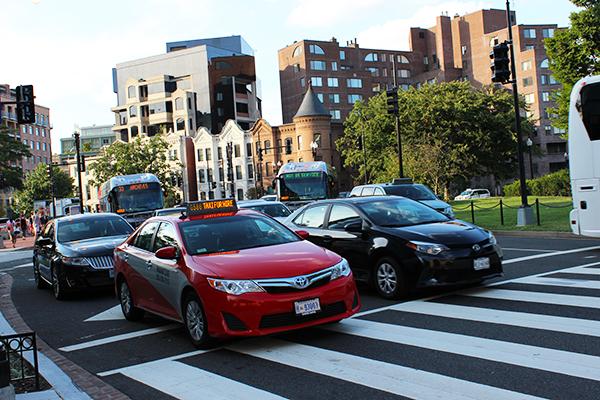The University’s top safety official is lobbying local taxi companies to accept GWorld, which he said will make students feel more secure in the city.
Senior Associate Vice President for Safety and Security Darrell Darnell said he is pushing the D.C. Taxicab Commission to recognize GWorld as a form of payment so students have more options for returning to campus late at night. But the plans, which are still in the early stages, likely won’t move forward for several years.
With a Metro rail system that closes at midnight on weekdays and 3 a.m. on weekends and that doesn’t reach every part of the city, Darnell said he wants taxis to accept GWorld so students without cash or a credit card can find transportation.
“What I really don’t want to see is someone walking from Dupont Circle at one in the morning because they can’t catch a taxi,” he said.
Many schools across the country, like Vanderbilt, Virginia Commonwealth and Northeastern universities, allow students to pay for taxi rides with their official ID cards.
“We are hoping that [cab companies] will see that there really is a market out there for it and start accepting GWorld,” Darnell said.
The proposal comes after officials released an app last month that allows students to report crimes and call for emergency services. The app also gives students the option to call a cab from a list companies.
Darnell said if students use the GW PAL app to call a taxi when they don’t have a safe way to get home, companies will be more likely to get on board with a GWorld payment system.
“There’s just so many hurdles we have to get through and they were skeptical, but we’re hoping if enough students use [taxi services], they’ll see that ‘Hey, we have a lot of GW students who are calling us,’” he said.
Ward 3 Council member Mary Cheh, who heads the Council’s transportation committee, said she was interested in hearing GW’s proposal.
“I’m always willing to explore innovative ideas and this might be one of them,” said Cheh, who is also a professor at the GW Law School. “I have no idea how we might proceed with implementation, but I am quite willing to explore it.”
Last year, the Teamsters labor union that represents taxi drivers in the District sued the D.C. Taxicab Commission, claiming that newly installed credit card readers were causing drivers to lose sales when the machines did not work properly. Drivers faced fines and possible suspension for failing to add the card readers to their cabs.
Businesses who accept GWorld have said that they have had to inflate their prices to make up for the 8 to 10 percent commission GW earns for each item a student pays for using the card. The University also charges businesses a 10-cent fee for each purchase.
No schools in D.C. currently let students pay for taxis with their ID cards. In 2010, American University and the University of Maryland reached an agreement with the Washington Metropolitan Area Transit Authority to sell Metro SmarTrip cards in their bookstores, where students could use their account money to pay for them.
GW does not sell SmartTrip cards at its stores, but WMATA officials have supported the idea of expanding the service to more students.
“Many universities in the Washington region are Metro accessible, and we want to encourage students to take Metro as their preferred method of transportation,” WMATA Customer Service Chairman Chris Zimmerman said in a statement.







